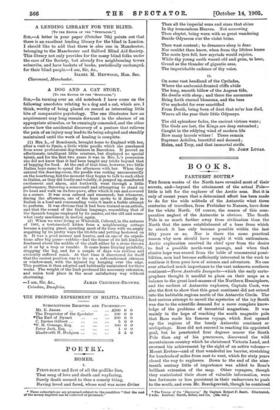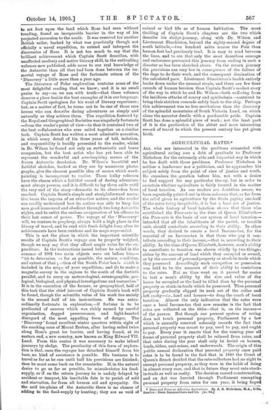FARTHEST SOUTH.*
THE frozen wastes of the North have revealed most of their secrets, and—beyond the attainment of the actual Pole— little is left for the explorer of the Arctic seas. But it is only of recent years that a. determined effort has been made to do for the wide solitude of the Antarctic what three centuries of travellers, from Frobisher to Nansen, have done for the white North. Of course, the reason of this com- parative neglect of the Antarctic is obvious. The South Pole is so much farther away from civilisation than the North that the mere establishment of a base from which to attack it has only become possible within the last fifty years or so. Nor is there the same practical reason why men should have sought it with enthusiasm. Arctic exploration received its chief spur from the desire to find a possible north-west passage, and when that elusive hope was erased from the table of commercial possi- bilities, men had become sufficiently interested in the work to continue it from pure love of science and adventure. No one ever attached much importance to the vast unknown southern continent—Terra Australis Incognita—which the early carto- graphers thought it needful to place on their maps as a balance to the great land-masses of the Northern Hemisphere, and the earliest of Antarctic explorers, Captain Cook, was also the first to show that this great continent did not extend into the habitable regions north of the Antarctic Circle. The first serious attempt to unveil the mysteries of the icy South was due to the scientific demand for a more complete know- ledge of the problems of terrestrial magnetism. It was mainly in the hope of reaching the south magnetic pole that Ross made his famous voyage, which first opened up the regions of the lonely Antarctic continent or archipelago. Ross did not succeed in reaching his appointed goal, but he penetrated four degrees nearer the South Pole than any of his precursors, discovered the wild mountainous country which he christened Victoria Land, and crowned his achievement by the sight of an active volcano— Mount Erebus—and of that wonderful ice barrier, stretching for hundreds of miles from east to west, which for sixty years closed the way to explorers. Down to the end of the nine- teenth century little of importance was added to Ross's brilliant extension of the map. Other voyagers, though they contributed their share of valuable information, were less fortunate or less persistent in their endeavours to push to the south, and even Mr. Borchgrevink, though he contrived * The Voyage of the Discovery.' By Captain Robert F. Scott. Illustrated, 2 vols. London: Smith, Elder, and Co. [42a, net.]
to set foot upon the land which Rosa had been without treading, found an insuperable barrier in the way of his projected excursion to the south. It was reserved for another British sailor, backed by what was practically though not officially a naval expedition, to extend and interpret the discoveries of Ross. It is not too much to say that the brilliant achievement which Captain Scott describes, with unaffected modesty and native literary skill, in the enthralling volumes now published, adds more to our real knowledge of the Antarctic than all that had been done between the im- mortal voyage of Ross and the fortunate return of the ' Discovery ' a little more than a year ago. The literature of Polar exploration contains some of the most delightful reading that we know; and it is no small praise to say—as we can with truth—that these volumes deserve a place beside the best examples of it in our language. Captain Scott apologises for his want of literary experience; but, as a matter of fact, he turns out to be one of those rare heroes who can describe daring adventures as simply and naturally as they achieve them. The expedition fostered by the Royal and Geographical Societies was singularly fortunate —from the reader's point of view—in that it contained two of the best collaborators who ever sailed together on a similar task. Captain Scott has written a most admirable narrative, in which every detail of his three years of toil, isolation, and responsibility is lucidly presented to the reader, whilst in Dr. Wilson he found not only an enthusiastic and brave companion, but the best artist who has yet been able to represent the wonderful and awe-inspiring scenes of the frozen Antarctic desolation. Dr. Wilson's beautiful and faithful sketches, backed as they are by numerous photo- graphs, give the clearest possible idea of scenes which word- painting is incompetent to realise. These balky volumes have the charm which a faithful record of daring adventure must always possess, and it is difficult to lay them aside until the very end of the story—dramatic to its close—has been reached. Captain Scott's simple and straightforward narra- tive bears the impress of an attractive nature, and the reader can readily understand bow its author was able to keep his men good-humoured and obedient through two long Antarctic nights, and to enlist the zealous co-operation of his officers to their last ounce of power. The voyage of the ' Discovery ' will, we venture to prophesy, always bold a high place in the library of travel, and be read with fresh delight long after its achievements have been outdone and its maps superseded.
This is not the place in which the important scientific results of Captain Scott's voyage can be properly weighed, though we may say that they afford ample value for the ex- penditure. In the instructions issued before he sailed in the summer of 1901 two main objects were set before him,— " (a) to determine, as far as possible, the nature, condition, and extent of that 1. ertion of the South Polar lands which is included in the scope of your expedition; and (b) to make a magnetic survey in the regions to the south of the fortieth parallel, and to carry on meteorological, oceanographic, geo- logical, biological, and physical investigations and researches." It is in the execution of the former, or geographical, half of this task that the chief interest of Captain Scott's book will be found, though the scientific value of his work lies mainly in the second half of his instructions. He was extra- ordinarily fortunate in exploration,—if fortune is to be predicated of success which. was richly earned by careful organisation, dogged perseverance, and light-hearted disregard of the most appalling form of danger. The ' Discovery ' found excellent winter quarters within sight of the smoking cone of Mount Erebus, after having sailed twice along Ross's great ice barrier, and having found, at its eastern end, a new country, now known as King Edward VII. Land. From this centre it was necessary to make inland journeys by sledge. The peculiarity of this form of explora- tion is that, once the voyager has detached himself from his base, no kind of assistance is possible. His business is to travel as far as he can until half his provisions are finished; then he must come back on the remainder. If, in the natural desire to go as far as possible, he miscalculates his food- supply, or if on the return journey he is unduly delayed by accident or tempest, his inevitable fate is to perish of cold and starvation, far from all human aid and sympathy. On the arid ice-plains of the Antarctic there is no chance of adding to the food-supply by hunting; they are as void of animal or bird life as of human habitation. • The most thrilling of Captain Scott's .chapters are the two which. describe his . sledge-journey, - along - with Dr.. Wilson._ and Lieutenant Shackleton, beyond the eighty-second degree of south latitude,—two hundred miles nearer the Pole than human feet had previously trod. It is easy to read between the lines, and to see that only the most dauntless courage and endurance prevented this journey from ending in such a disaster as has been sketched above. On the return journey the provisions ran very low in consequence of the failure of the dogs to do their work, and the consequent diminution of the calculated pace. Lieutenant Shackleton's health entirely broke down under the unusual strain, and there are few finer records of human heroism than Captain Scott's modest story. of the way in which he and Dr. Wilson—both suffering from the insidious attacks of scurvy and ophthalmia—contrived to bring their stricken comrade safely back to the ship. Perhaps this achievement was no less meritorious than the discovery of the splendid mountains of South Victoria Land, on which alone the narrator dwells with a pardonable pride. Captain Scott has done a splendid piece of work ; not the least part of it is the production of the ablest and most interesting record of travel to which the present century has yet given birth.















































 Previous page
Previous page